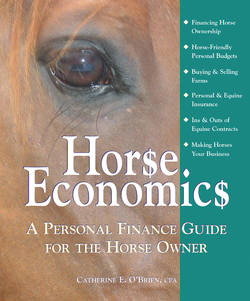Читать книгу Horse Economics - Catherine E O'Brien - Страница 14
На сайте Литреса книга снята с продажи.
THE HARD-SELL SALES PITCH
ОглавлениеWhen horse shopping, the following claims should raise a red flag:
“At this price, the horse won’t last long.”
”You had better make a decision—I have people lined up to see this horse every day this week.”
“Most of the people I sell to are just starting out, so I try to have really quiet horses.”
“My veterinarian has already looked at the horse, and he says the horse is fine.”
“I have recent pre-purchase exam records right here, so you won’t need one, which will save you money.”
“The first or second person who sees this horse will buy him.”
And, if you hear any of the following during negotiations, hang on to your deposit and look elsewhere:
“I don’t make sales subject to vet checks or pre-purchase exams anymore,” followed by some story about how the seller lost two weeks of valuable sale time when a customer didn’t end up purchasing a really great horse.
“I’ll take your deposit, but it won’t hold the horse while you make arrangements for your vet. If someone sees the horse and writes me a check for the purchase amount, the horse is sold.” (Then essentially, your deposit is meaningless.)
“You can have a right of first refusal. If someone wants to buy him, I’ll call you and give you the option of purchasing the horse first.” (You don’t know if another buyer even exists.)
The horse was not the best mover and a little short-strided in front, which I assumed was due to his fairly upright pasterns. I held the gelding’s right front leg bent for one minute, and then we trotted him off. He was lame. I flexed the other front leg and the gelding was off on that side as well. He certainly did not appear sound enough to stand up to any kind of work for any length of time.
I realized then how easily someone could get pressured into buying a horse. Because I really liked the gelding, I was a prime candidate for the “hard sell.” A horse might be offered at a great price, but you need to know what soundness and maintenance issues may be awaiting. Your “cheap” horse won’t be cheap if he is chronically lame requiring frequent visits from the veterinarian, pain medication, and expensive supplements every month. A reputable horse person will allow you to have a horse vetted, honor your deposit, and hold the horse for you for a reasonable amount of time.
The True Cost of an Unsuitable Horse
Unfortunately, when a new horse is purchased, he doesn’t come with a guarantee that he will be a perfect match in temperament and ability for the rider. Just as people are affected and shaped by their experiences in life, a horse comes with baggage, too. Evaluating a new horse takes time, much longer than the two-week trial period prospective purchasers may be able to negotiate. Sometimes, it may take months for a horse to adjust and bond with his new owner, learn the new rider’s communication style, and unlearn bad habits he may have picked up in former homes.
However, if a horse and rider are not making progress after six months, or the horse is exhibiting unexpected and dangerous behavior not caused by the handler or rider, it may be time to assess the long-term viability of the partnership. Consult your instructor and veterinarian if you are having difficulty with your new mount. You may have purchased an animal you simply don’t get along with or that wasn’t properly represented to you. If this is indeed the case, you should find a trainer or rider who is more compatible with your horse to work with him and prevent any bad behavior from becoming habit. The trainer can evaluate the horse, correct unwanted behaviors, and reeducate the horse, if needed. This process can either better your own relationship with the horse or facilitate the sale of the animal to a buyer who is a more appropriate match.
Clinging to a horse that is not going to work for you may cost more than just board and maintenance. While there are inherent risks in handling any horse, those risks are increased with a horse that you are afraid of, or one that exhibits particularly dangerous behavior. Plus, horse ownership is supposed to be fun. If you are not enjoying your horse and the time you spend at the barn, you are defeating the reason you purchased a horse in the first place.
